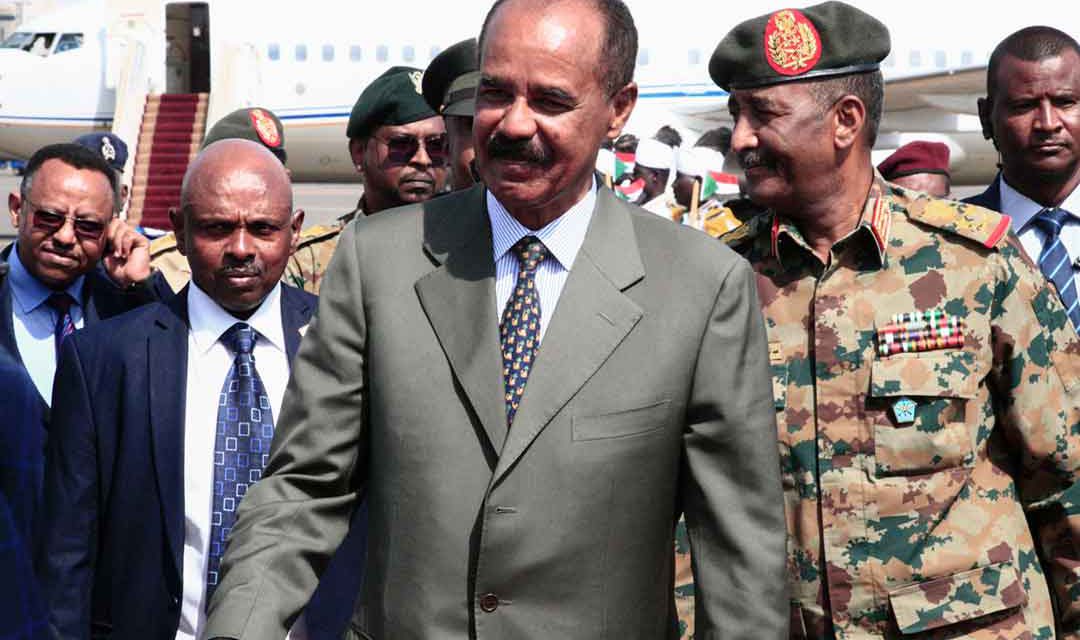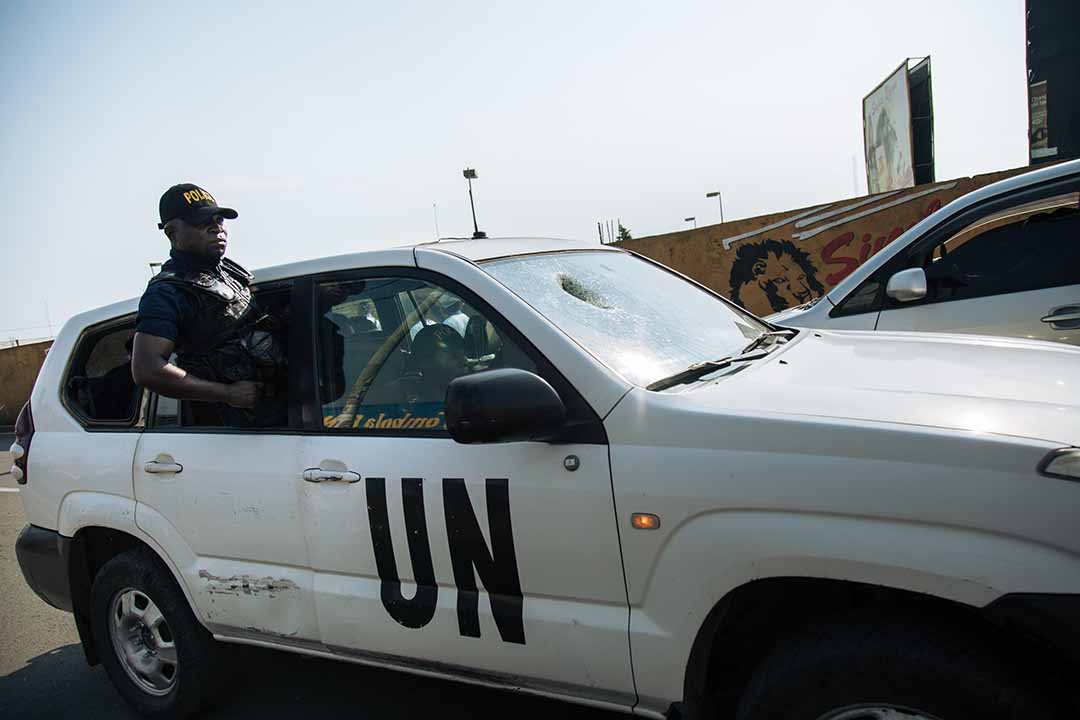Eritrea is a paradox, a country that dips vertiginously from the mountains into the sea, from mellow temperate Asmara, the capital, to the scorching coastal port of Massawa. On the capital’s boulevards, fashionistas rock Afros and skinny jeans while espresso machines roar in the cafés. Asmara is a modernist wonderland. But behind these tired, beautiful buildings lurks a secret, shadow world. And one does not have to amble too far down the capital’s Harnet Avenue to find its locus. Eritrea’s Ministry of Justice, an imposing sunset-yellow structure on Asmara’s main boulevard, is one of many exemplary structures of rationalist architecture built by the Italians throughout the capital during the colonial period. Originally the offices of the department of economic affairs, it became the High Court during the British administration of the 1940s. In 1950, when Eritrea was unhappily placed under the care of Ethiopia by a disputed UN resolution, the distant court in Addis Ababa oversaw the justice ministry, first under Haile Selassie, the Ethiopian emperor, and then his communist successor, Mengistu Haile Mariam.
In 1993, when the country’s independence was formally declared, Eritreans began administering their own courts for the first time. It should have marked a new era of Eritrean rule of law. In practice, it has been the opposite. Eritrea is perhaps Africa’s least known and most insular state, scarred with a tragic history. In the 20th century three successive colonial regimes ran the country with disdain and violence. A 30-year war for independence followed, leaving Eritrea desperately poor and underdeveloped. While Asmara is perhaps the most intact colonial city on the planet, the rest of the country is in a state of deplorable disrepair. Instead of reaching out after winning independence in 1991, President Isaias Afwerki used his coming-out speech at the United Nations to berate the outside world for its manifold betrayals. “I cannot help but remember the appeals that we sent year in and out to this assembly and the member countries of the United Nations describing the plight of our people,” he began.
“We appealed to the UN not only in its capacity as a representative of the international community, but also because of its special responsibility to Eritrea. For it was the UN that decided in 1950, at the beginning of the Cold War, to deny the colonised people of Eritrea their right to self-determination, thereby sacrificing their national and human rights on the altar of the strategic interest of the superpowers.” And so Mr Afwerki locked the gates, and the country slowly stultified. The 1997 constitution never became law; none of its lofty clauses were implemented. Opposition parties were banned, dissidents were either jailed or disappeared. The country pursued a disastrous border flap with Ethiopia from 1998 to 2000, and has maintained a war footing ever since. Compulsory military service can drag on for decades; conscripts have complained that they are effectively enslaved and forced to work on infrastructure and mining projects for less than a living wage. Meanwhile, Mr Afwerki has wiped out anything resembling an independent press. Internet connections (when they exist) seem to date back to the Jurassic age.
Who watches the watchmen? There is no need to ask this question. The president’s comprehensive spy network is tracking everyone. Brother spies on brother. It is therefore no surprise that Eritreans have been protesting with their feet. Over 400,000 citizens have fled the regime since independence—a figure that amounts to nearly 8% of its 5.1m population, according to the UN High Commissioner for Refugees. Three thousand Eritreans leave every month, across the scorching border with Sudan, contributing massively to the refugee crisis currently bedevilling European shores. What place can justice have in such a milieu? The UN Human Rights Council asked a similar question, and in June 2014 established a commission to look into Eritrea’s human rights. The compilers of the commission’s report note in the report’s preamble that they were unable to visit the country, and relied exclusively on over 500 interviews and 160 written testimonials from Eritreans in the diaspora. And while a few espressos in Asmara’s pleasant cafés might have taken the edge off the report’s unrelenting grimness, there is not much call for levity.
“The government has created and sustained repressive systems to control, silence and isolate individuals in the country, depriving them of their fundamental freedoms,” says the commission’s report. “Information collected on people’s activities, their supposed intentions and even conjectured thoughts are used to rule through fear in a country where individuals are routinely arbitrarily arrested and detained, tortured, disappeared or extra-judicially executed. The problems with the country’s justice system could be described as ontological: a judge’s career, according to the commission, begins at the defence ministry. Judges at the community court level may be elected, but anyone on the High Court bench in Asmara is likely a conscript — often paid less than $2 a day—and therefore under military control and, in turn, under the president’s thumb. As a second firewall against anything resembling judicial independence, the justice ministry functions under the aegis of the president’s office.
A special military tribunal funnels judgments through the armed forces’ pipeline, and works as the de facto highest court in the land. If there was a breaking point, it must have been when Mr Afwerki cracked down on all criticism and dissent in August 2001. Security forces arrested 11 leaders from within the government who had dared to question the president’s record. Most notably, he removed Teame Beyene, who had served as the High Court’s chief justice since 1994. His sacking was all but inevitable after he called for the cessation of the special tribunal and complained about the executive branch’s pervasive interference in judicial proceedings. “With the arbitrary dismissal of Judge Teame Beyene in August 2001, the Eritrean judicial system has sustained irreparable damage, particularly as regards its major function of safeguarding fundamental rights and freedoms, as well as restraining government’s authority,” a group of legal professionals noted to the commission. Judge Teame’s dismissal left a vast gap, most of which was filled with Mr Afwerki’s home-grown brand of authoritarianism.
Judges who believed themselves to be independent were quickly disabused of that notion, and were either directly or indirectly threatened if they did not join the ruling party. As one ex-judge noted to the commission: “I always had to carry a mobility paper to move from any place to another within the city or to other cities, and have been subjected to threats and intimidation by patrolling military police on many occasions. There was even a time I was severely beaten up by plainclothes soldiers (military police) … Following the beating, I had attempted to report the incident to their military station, which was located in Asmara, but was met with further threats and intimidation. I never felt safe in Eritrea.” Prominent military officers often become involved in cases before the regional and high courts, and demand rulings that suit them either politically or economically. “Investigators, security officers and military leaders also act as de facto magistrates,” the commission’s report said. The blending of the security state and the judiciary has become a waking nightmare for Eritreans.
The (mostly) Muslim Afar ethnic group are routinely targeted in military-sanctioned campaigns of violence. Judgments are often made based on investigative reports, some of which are ballasted by statements obtained under torture. No Eritrean public official has ever been prosecuted for a human rights violation. The country’s courts are run by the powerful, for the powerful, and the state’s most vulnerable citizens bear the brunt of this uneven arrangement. “Virtually everyone in Eritrea runs the risk of being arbitrarily arrested and detained: men and women, children and elders, political opponents and supporters of the regime, religious believers and atheists, high-ranking officials and ordinary citizens,” notes the commission. When this happens, there is absolutely no due process available to the detainee. Like a scene out of the Steven Spielberg sci-fi thriller “Minority Report”, it is possible to be arrested if an official or spy believes one’s thoughts to contain ill intent. No court order is necessary to detain a suspected dissident; there is no legal time limit on the length of arbitrary detention.
“I could take a person and put him in prison for 10 days without any reason,” a former security officer told the commission. “I do not need to go to a judge at all … or for instance, if I suspected the person is a military [person] and has fake documents, I can decide what to do, detain him, interrogate him, release him or keep him in detention. The National Security Office is the only office we report to. We just need to inform them.” The prisons are filled with nameless, numberless detainees. The attorney general’s office is by law empowered to oversee the police’s investigatory practices in the prison system, and despite much hostility, judges have made surprise spot-check visits. But judge after judge has found that the police have no power over those in their prisons, and they routinely abrogate responsibility to the security services. As the testimony of many exiled Eritreans makes clear, the state is firmly in the hands of the president and his security forces, with no checks and balances available from the judiciary. The High Court buildings on Harnet Avenue remain something of a front, a cover for the paranoid regime that works through the last of its peoples’ resolve. Until the state relinquishes some power and reintroduces a constitutionally protected rule of law, the Eritrean tragedy will not cease.











